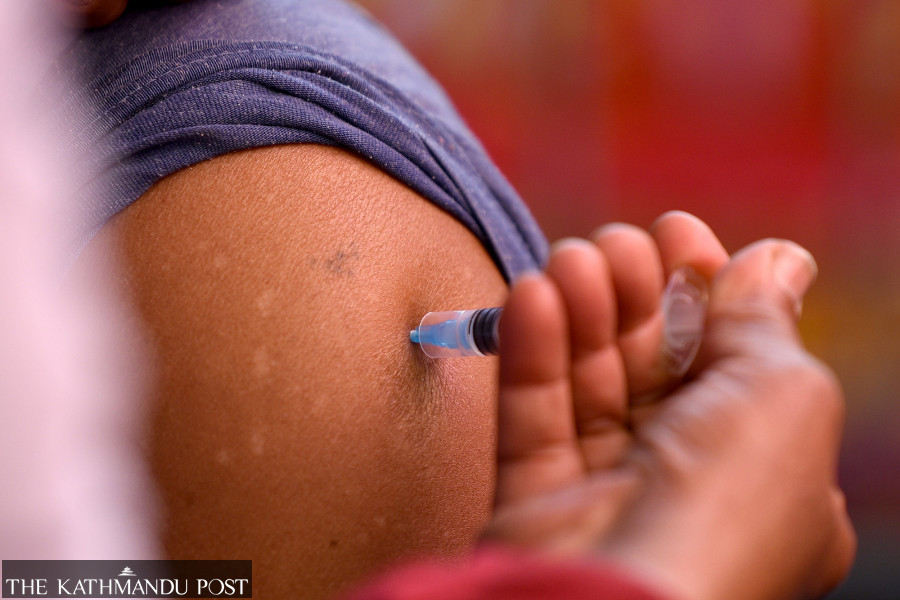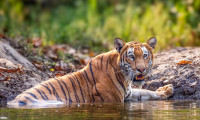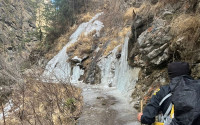National
Wildlife workers not vaccinated despite being in risk group
Park officials engage with wildlife and local communities, so it is important to protect them as well as animals from infection, conservationists say.
Chandan Kumar Mandal
Chitwan National Park has carried on with its conservation activities as if there was no pandemic.
In recent months, they have nabbed many poachers involved in the killing endangered one-horned rhinos and kept a check on illegal activities in and around the park area.
The park authorities even managed to count nearly 700 rhinos dwelling in various parts of the protected area as part of the nationwide rhino census in the middle of the Covid-19 pandemic.
But working during such a difficult time, which has multiplied challenges for the wildlife conservation sector, has also invited the risk of Covid-19 infection for the officials of the Chitwan National Park and other parks.
A significant number of park officials are not vaccinated.
The Chitwan National Park has a total of 376 staff members. However, even after nearly five months of the nationwide vaccination drive, nearly half of them have not received any dose of Covid-19 vaccine.
When government officials were being vaccinated, many of the park’s staff members could not receive the vaccine for various reasons.
“Some staff members were deep inside the jungle, where the phone network is unreachable, when the vaccine was being administered,” Ana Nath Baral, chief conservation officer of the park, told the Post. “It was the time when there were frequent rhino deaths inside the park and poachers were active. So they were busy dealing with such incidents and other conservation activities.”
Many park officials, including Baral himself, are waiting for their turn to get inoculated.
“While the vaccine was being administered, we thought that the government would announce other vaccination dates, but that was not to be, ”said Baral.
The government has failed to secure vaccines to inoculate the population against Covid-19.
With the uncertainty over the arrival of vaccines, park officials working on the ground level in various protected areas across the country are worried that they might contract the coronavirus.
According to them, working with people in communities living around the park on a day-to-day basis and handling wildlife species make them prone to contracting the infection, as well as transmitting the virus to animals.
“Sometimes we have to go out to nab suspected poachers. We also run into people from nearby villages while patrolling the park area,” said Baral. “Frequent interaction with people can increase the risk of infections for both officials and the people of local communities.”
Nepal’s 20 protected areas—six conservation areas, one hunting reserve, 12 national parks and one wildlife reserve—have over 10,000 human resources, which includes nearly 2,000 park officials and nearly 8,800 security personnel.
Due to their day-to-day activities involving locals and valuable wildlife, they should be prioritised for Covid-19 vaccination, say wildlife conservationists.
“The kind of work they do on a daily basis requires them to be safe from Covid-19. They have to arrest people involved in prohibited activities inside the park, patrol the park area and engage with local communities, making them highly susceptible to the coronavirus infection,” said Haribhadra Acharya, spokesperson for the Department of National Parks and Wildlife Conservation.
Wildlife conservationists argue ensuring the vaccine to park officials is also imperative to prevent infection among wild animals.
As the coronavirus started making people sick across the globe, the virus spillover, the process of transmitting from one species to another, has been reported in various species like pet cats and dogs and multiple zoo animals, including big cats and gorillas.
Reports have shown that such infections had occurred even when the personnel involved in their caretaking were wearing personal protective gear.
Recently, a lion died of Covid-19 infection in a zoo in Chennai, India.
“Wildlife workers are working 24-hours to protect the wildlife. Every now and then, they also need to rescue wild animals. During such times, the virus can easily transfer from humans to animals,” said Acharya, who is also an ecologist.
“When government officials were being vaccinated, many wildlife conservation workers were busy doing their jobs deep inside jungles of protected areas. They were deprived of the vaccine then. The government should put them on its vaccine priority list.”
According to a recent study that assessed the risk of Covid-19 in wildlife, wild animal populations emerging as a reservoir of infection would pose a significant risk to public health.
The study report warns of a potential infection spillback into communities where “the burden of infection had been reduced through control measures and/or herd immunity.”
Besides, the report states, sustained transmission in a wild host population would provide an opportunity for evolutionary adaptation of the virus that could potentially—positively or negatively—influence transmission dynamics and the effectiveness of diagnostics and vaccines.
The report calls for broader surveillance and risk assessment of other coronaviruses in wildlife, domestic animals and human populations at high risk of exposure to remain better prepared to prevent and control their potential impacts on human and animal health in the future.
Transmission of the virus from humans to wildlife and again from wildlife to human is a major concern raised by wildlife conservationists.
Vaccine is the only solution to protect humans as well as wildlife, but many people working in the field of wildlife conservation remain unvaccinated.
Despite being one of the first countries in the world to launch its vaccination drive in January, Nepal’s vaccine crisis has deepened now, as it has not been able to acquire the required vaccine doses.
Government data show 2,500,196 people had taken the first dose of the vaccine and 731,653 had taken the required two doses as of Monday.
The Ministry of Forests and Environment does not know how many people working in protected parks have been vaccinated so far, but agrees that they should be vaccinated at the earliest.
“The concerned agencies must coordinate with the Health Ministry to ensure the vaccine to those park officials who missed out earlier,” Buddi Sagar Poudel, spokesperson for the ministry, told the Post.
He said that the Environment Ministry would start collecting data on vaccinated and not-vaccinated officials from all the parks before taking the matter to the Health Ministry
“If wild animals are our valuable assets, then we must protect those protecting these national treasures. Keeping them safe means protecting wildlife, which they frequently handle, and also stopping such outbreaks from wildlife,” Poudel told the Post.




 11.84°C Kathmandu
11.84°C Kathmandu













